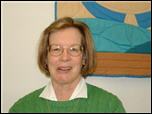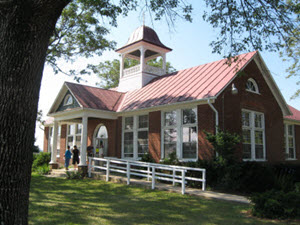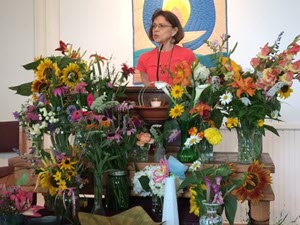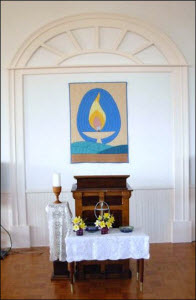
HUU Sermon Archives
Katrina Sermon
Presented By Elizabeth Ihle
September 18, 2005
 I
don’t know the origin of the Gathering of the Waters tradition in Unitarian Universalism,
but it has been around a long time. It celebrates in the fall the coming together
again of a UU congregation after many summer vacations and other necessities have
scattered a congregation to the four winds. It is a way of saying, “it’s good
to back, and we are glad to be together again and to support each other.”
This morning I would like to expand on the idea of gathering to the waters to a
cosmic and national level and then return to the microcosm of HUU.
I
don’t know the origin of the Gathering of the Waters tradition in Unitarian Universalism,
but it has been around a long time. It celebrates in the fall the coming together
again of a UU congregation after many summer vacations and other necessities have
scattered a congregation to the four winds. It is a way of saying, “it’s good
to back, and we are glad to be together again and to support each other.”
This morning I would like to expand on the idea of gathering to the waters to a
cosmic and national level and then return to the microcosm of HUU.
The cosmos certainly gathered the waters August 29th and threw much of them at the Gulf Coast and New Orleans. The storm now nearly weeks ago has offered us Americans an opportunity to gather together and ask ourselves who we are and what do we value.
People expressed some of their values in the explanations that they offered for Katrina, and some of the explanations are so bizarre that they might even been entertaining if they weren’t so sincere. Having been widely criticized for blaming 9/11 on feminists, abortionists, and homosexuals, Jerry Falwell and Pat Robertson had apparently learned a lesson and were noticeably and wisely silent about the cause of Katrina. Not so, for others. Antiabortion activist Steve Lefemine maintained that he saw an image of an 8-week-old fetus in the clouds and quickly announced by email that “God judged New Orleans for the sin of shedding innocent blood through abortion.” On the answering machine of his organization, Columbia Christians for Life, he announced the “Providence punishes national sins by national calamities. Greater divine judgment is coming upon America unless we repent of the national sin of abortion.” A Kuwaiti official opined in the Arabic daily Al-Siyassa under the headline “The Terrorist Katrina is One of the Soldiers of Allah” that “it is almost certain that this [storm] is a wind of torment and evil that Allah has sent to this American empire.” A Christian journalist in Israel was struck by the parallel of Jews being removed from Gaza with Americans being removed from New Orleans. “Is this some sort of bizarre coincidence?” he asked. “Not for those who believe in the God of the Bible…. What America is about to experience is the lifting of God’s hand of protection; the implementation of His judgment on the nation most responsible for endangering the land and people of Israel.” Then there was Michael Marcavage was actually an intern in the Clinton White House and who now runs Repent America. In a telephone interview he noted that God is in control of the weather, and “The day Bourbon Street and the French Quarter was flooded was the day that 125,000 homosexuals were going to be celebrating sin in the streets…We’re calling it an act of God.”1 My favorite version of the “act of God” theory is a Southern one. Jo Rusin, a woman standing in front of the pile of loose bricks that was her retirement home in Waveland, Mississippi, observed “When God decides to clean house, he doesn’t just use a Swiffer WetJet.” 2
Trying to find a cause for cataclysmic weather is an endeavor that is as old as humankind. Our questions and explanations about Katrina mirror those myths from long ago, and human history reveals all kinds of flood myths. Almost every culture has one. Noah and his ark have lots of mythological company. According to Greek folklore, early humans were punished for their wickedness by a vengeful god, who stirred up a torrential storm and commanded the oceans to rise, drowning every living thing. In Welsh mythology, the lake of Llion overflows, swamping everything save the Celtic heroes Dwyfan and Dwyfach who escape the waters in a mastless ship packed with two of every species. (Does that sound familiar?) and in Kenya, legend holds that the ocean once fit in a small pot owned by a poor couple. The husband warned his daughter-in-law never to touch it, explaining that it held the remains of their honored ancestors. She couldn’t resist, the pot shattered, and—you guessed it—a flood drowned every living thing.3 Yes, there’s a pattern here: heedless people bringing on not only their own demise but that of everything around them. But here’s a different flood myth. What values does it reflect?
The Confucian flood myth begins in the usual manner, with the king asking his faithful minister, Gun, to save the country from rising waters. Unfortunately, Gun is an arrogant guy and thinks that he can control nature. He labors for nine years, building many dams to stem the raging tide. As each dam falls apart, the waters rage ever stronger. Eventually the king wises up, banishes Gun, and orders Gun’s son, Yu, to try solving the problem of flooding. A humble man, Yu quickly studies the problem and concludes that attempting to constrain nature is futile. Rather than build dams, he gently channels the floodwaters into an irrigation system. The crops bloom, the waters recede, the people are saved, and Yu is anointed king.4
This myth is, of course, more aligned with the values of today’s scientists and environmentalists, who say in a far more complex way than I’ll use here that the size of hurricanes such as Katrina is affected by global warming, which is a result of using too much fossil fuel. As most of us watched the price of gas immediately soar as oil workers evacuated rigs in the Gulf of Mexico and seven oil refineries and a major import terminal closed, the impact of limited fossil fuel became clear: our pocketbooks would hurt.
Although no one can adequately explain Katrina, the problem of receding marshland, which would normally be a flood buffer, along the Gulf received much more attention. Our human made structures were no match for nature, and our vision of such of a catastrophe was too limited. Although scientists had clearly developed a scenario of what a category four or five storm could do to New Orleans and the Gulf Coast, policymakers and legislators ignored scientific models, and the citizens of the Gulf—and to some degree all Americans—paid the price. There is an excellent article about the scientists’ scenario is the October 2004 National Geographic.
Many of us were riveted to our televisions for days following the storm, and the impact of seeing the human suffering Katrina caused tugged at our heartstrings and our purse strings and once again made us as a nation address our values. It gave us a profound look at class differences and gave many of us in the comfortable middle class a much closer and sometimes uncomfortable look at stark poverty in our own country. Katrina made the invisible poor visible, and it wasn’t often a pretty sight. The Red Cross and the Salvation Army have received record donations, and many other smaller groups, including the Unitarian Universalist Service Committee, have sent money and resources to the affected areas. However, anecdotes from many sources reveal that some of the first people on the scenes were ordinary folks like us. As you may know, my partner Ann took a truckload of supplies to family and friends in Biloxi, and the first bus to transfer folks from the Superdome to the Astrodome was commandeered and driven by a twenty year-old. An email account of travelers leaving New Orleans indicated that simple kindness and cooperation of strangers was far more effective than law enforcement. As I have dealt with getting Ann’s niece Olivia in school and settled into Harrisonburg, I have been amazed by the interest and generosity of almost total strangers who have offered to help. It reinforces that idea that the number of kind people willing to help even strangers vastly outnumbers the hate mongers espousing political or social causes who rejoice in the suffering that a storm that inflicts on innocent people.
Although I have been somewhat out of the loop of HUU conversation about Katrina, I know that this storm and its aftermath have helped draw us closer to one another just as the Gathering of the Waters tradition does. We have agonized together over the devastation and suffering of our fellow citizens, felt the pain of the poor who were largely ignored, raged at the ineptitude of relief efforts, and given in whatever ways we could to help. Katrina was an awful storm, but its gift to us was to encourage us in the Shenandoah Valley to re-appreciate our own blessings and to become better people by giving what we could to help Katrina’s victims. The waters gathered by Katrina wreaked tremendous havoc, but they offered us an opportunity to rise above our daily lives and to help others.
Although the waters that we have brought this morning symbolizing our travels have not changed us so dramatically as Katrina changed the lives of a million or more, we have changed since our last Gathering of the Waters. For some of us, that change might have occurred in an instant, while for others of us the change has been more gradual. In a minute when you come forward to pour the water symbolizing your individual journey into the bowl symbolizing our common life, please think about the changes you have experienced and new paths that have opened to you in the past year.
Zen master Suzuki Roshi described the flow of human existence as a river that sometimes encounters a waterfall. In the waterfall each of us is like an individual droplet of water that falls separately down the trajectory and then rejoins all the other droplets to continue the journey together in the river. That’s a good analogy for our gathering of the waters. For some of us the water we will pour into the bowl symbolizes the elixir of life or renewing rain but for others of us the power of nature’s devastation. Sunrise, sunset, sunny days, storms—they are all a part of the circle of life.
Please come forward now with your water for our common bowl, and explain briefly if you wish the significance of your contribution. When everyone is finished, we will close this part of our service with a Blessing of the Water and then, if time permits, have a community dialogue.
I’ll take these waters home, boil them, and bring them back for our congregation to use in the coming year for water for our pebble bowl and any ceremonies that require them. Now let’s bless them.
Let the waters flow washing away indifference.
Let the waters flow setting free a flood of hope in a world beset
with poverty and greed, hatred and war.
Let the waters flow through us in love and compassion for
all living creatures and their environment.
Let the waters flow reminding us that life is precious.
Blessed be.
1 Allan Cooperman, “Some Cite Divine Retribution,” Washington Post, September 4, 2005.
2 Washington Post, September 4, 2005.
3 Ellen Ruppel Shell, “Our Hubris and Folly,” Washington Post, September 4, 2005.
4Ibid.
Read more sermons or talks by Elizabeth Ihle.
- Little Cabin in the Woods
- Come to My Garden: 2002 Flower Communion
- Fire: The Light Within and Without
- Hildegard of Bingen: A Medieval Mystic for the Modern Age
- Katrina Sermon
- Thank Heavens for Mother Earth!
- Thanksgiving: An American Tribal Holiday
- Washin' in the Water, Goin' with the Flow
- Sacred Spaces
For the latest sermons and events at HUU, visit our Community Cafe.
Inclement
Weather Policy
Worship
Service Materials


UUs on YouTube
Our denomination has an official presence on YouTube! The Unitarian Universalist Association's YouTube site includes several videos and lots of interesting commentary.
Harrisonburg Unitarian Universalists 4101 Rawley Pike | Harrisonburg,
VA 22801
Mailing Address: | PO Box 96 | Harrisonburg, VA 22803
| (540) 867-0073 | Webmaster
HUU is a member of the Southern
Region of the Unitarian Universalist
Association
Privacy Policy &
Disclaimer
Site Design & Maintainence : Expression
Web Tutorials & Templates


